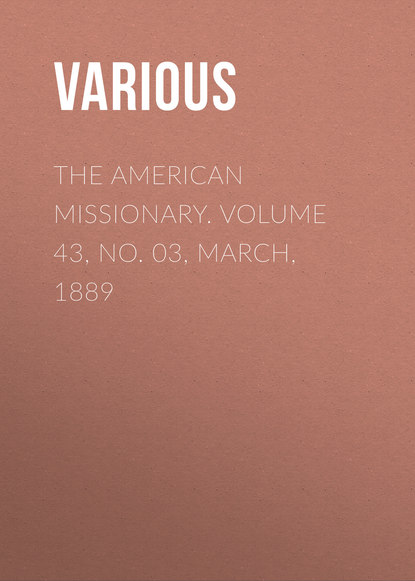По всем вопросам обращайтесь на: info@litportal.ru
(©) 2003-2024.
✖
The American Missionary. Volume 43, No. 03, March, 1889
Автор
Год написания книги
2019
Настройки чтения
Размер шрифта
Высота строк
Поля
I was so late in returning from the meetings at Oahe, though I hurried as fast as possible, that the river was frozen, detaining us nearly three weeks. The ice broke, letting the wagon with all my winter supplies go down. My trunks with all my clothing also went down. It wholly ruined all the clothing which could not be washed. My best dress was a frozen block of ice when I took it out—can never be worn again, and, in fact, all my clothes were ice. I was so thankful that no lives were lost that it hardly seems worth speaking of. I find myself poorer, if not wiser. I am worked down at present. Have kept "open house" now for two weeks, and my head refuses to be worked any further. Miss Emerson must wait for my letter. After Christmas I can write. I have so many patients, and so much work to take care of spoiled clothes and provisions, and to look out for winter supplies again, that I am not in a condition to write.
FOR THE CHILDREN
A few weeks ago, I stood by my window watching the children gathering for school. My attention was attracted to three girls coming up the street, one carrying a bundle done up in a handkerchief in one hand and books in the other, while the other two carried a trunk between them. As they turned toward the house, I ran down to meet them; they came with smiles, saying they had come to school. As I bade them welcome, my eyes filled with tears, and a prayer went up to God that he would bless those girls and make them a blessing. Susan, Angeline and Emma have proved to be intelligent, pleasant girls and very appreciative.
I have had one hundred and seven girls in sewing, this quarter; they seem as interested in their work as ever. Some of the older girls are doing well in cutting and basting. We hope to have a class in dressmaking soon. The little ones are very happy to have sewing days come. I am often met with the question, "Is us going to sew to-day?" I meet these forty little ones in a large sunny room, (that is to be our parlor some day, I hope) for an hour and a half each week. Their eyes brighten at the sight of the basins of water and the work basket. They apply themselves as demurely as their elder sisters; they love to sing little sewing songs and hear stories while they ply the needle.
From a teacher in Beach Institute, Savannah:
One of my new pupils has a name much longer than himself. It is Ulysses Virginia Lee, and in addition, the surname Smith. Another new boy is Josie Mike, and I think it might well be changed to "Mite," because he is such a small specimen. He could not tell his age, and we thought him too much of a baby to come, but took him for a week on trial, and as he is rapidly learning the ways of the school, we shall let him stay. Last Friday, while trying to impress upon him that only good behavior would insure him a desk in my room, I wrote some of his sayings. "Why do you want to come here to school?" "To larn something." "What if you are naughty and we send you away?" "Go to other school." "Why did you leave that other school?" "They won't teach me nothin." In answer to the question what kind of a boy he intended to be, instead of saying "good" as I expected, he replied, "I'll be a Beach boy." So he was ready with an answer to every question, and I am only sorry that I cannot reproduce for you his little face and the funny inflections of his voice, as he looked me right in the eye, his own little eyes just dancing with fun.
One of the little Indian girls whose name is Polly has just come in to ask, "Miss D., what is a wog? One white boy called me a polliwog, and I thought a wog must be something bad."
RECEIPTS FOR JANUARY, 1889
H.W. HUBBARD, Treasurer,
56 Reade St, N.Y.











